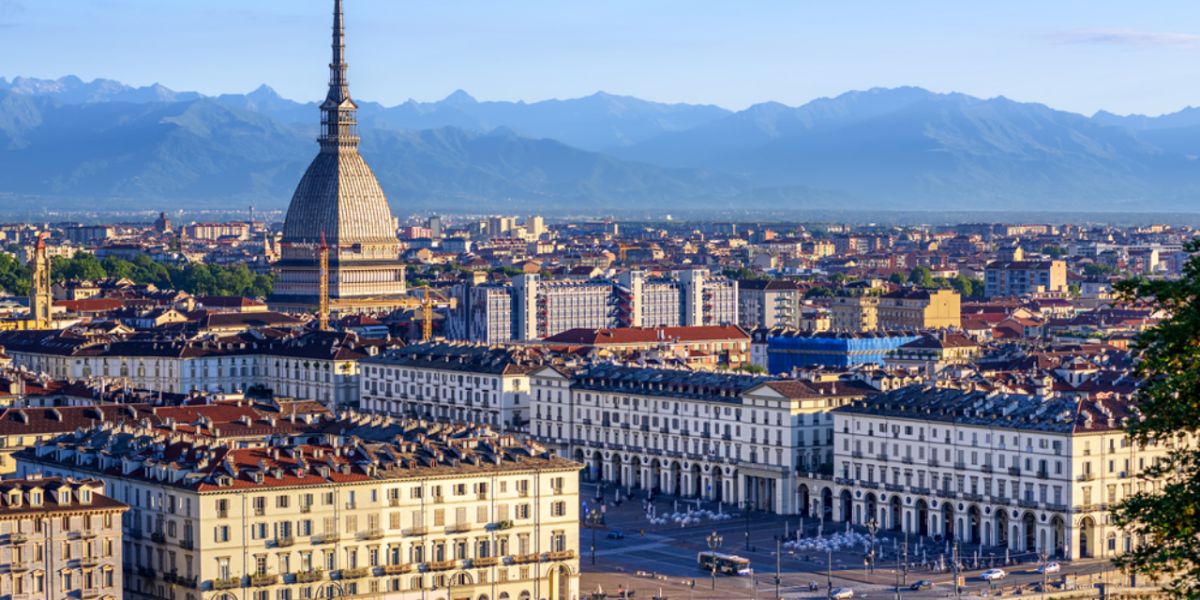
Like many industrial cities in northern Italy, Turin has weathered the effects of the global economic crisis. Employees in the city continue to enjoy a higher income on average than in the rest of the country, except in Milan, which is considered the economic capital of Italy. Furthermore, although the cost of living in Turin is higher than in smaller provincial cities, it is significantly lower than in larger cities such as Milan or Rome. If you are considering a work experience in Turin, we will give you some tips in this article to plan your move in the best way.
Turin has always been a favorite destination for expatriates. Between its many industries (automotive, agribusiness, electronics and tourism) and its promotion of the arts (galleries, museums, architecture and dance), Turin is among the wealthiest provinces in Italy in terms of average income. The city is also home to a host of successful European companies as well as many national headquarters and industries, including Fiat, Lavazza and Ferrero.
Economic climate in Italy
Italy has been hit hard by the global financial crisis of recent years, including the Covid pandemic and the war in Ukraine, as Italy is a country heavily dependent on Russian gas. Currently, the unemployment rate is 7.8% of the general population and 23.0% of the unemployed are young people (November 2022 figures / ISTAT), which means that competition for jobs is high. Nevertheless, the engineering, tourism, pharmaceuticals, food and technology sectors are particularly in demand.
Thanks to the introduction of the Jobs Act in 2015, the Italian labor market has changed considerably. The law has restored the balance between the rights of workers and employers, notably by reaffirming unemployment rights and abolishing the most precarious employment contracts. This has closed the gap between Italy and its European counterparts, making the country fairer and creating opportunities for local and international investors. Read our article on "Working conditions in Italy".
Sectors that recruit in Turin
When it comes to employment in Turin, competition is strong, as it is in much of Italy, but this should not be a problem for foreign applicants. Indeed, if you are fluent in several languages (French, English and Italian) and have international experience, especially in finance or business, technology and IT, design, food or chemistry, your profile will likely be more interesting and relevant on the Turin job market. Moreover, in Turin as in the rest of Italy, experience (esperienza) is more than just an added value to your academic background.
Due to its national and international activities, Turin is one of the most prosperous cities in the country, belonging to the "industrial north" of Italy. Start your job search in Turin with large companies such as Lavazza, Ferrero, Barilla, Martini & Rossi, UniCredit, Fiat, Telecom Italia, RAI and IVECO. In terms of design, the city is not to be outdone and has a well-developed sector of activity. In 2008, Turin was awarded the World Design Capital Prize, and in 2014, the Creative City Prize by UNESCO.
Like Milan, Turin is also home to a vibrant start-up community, with over 500 innovative start-ups and a network that brings together digital innovation and industrial production. The Ministero delle Imprese e del Made in Italy website regularly publishes figures on start-ups in Italy and its various regions. Turin's strong industrial tradition makes it a popular destination for entrepreneurs and researchers, not to mention its lower cost of living than major cities like Rome and Milan.
Turin is third on the list of Italian cities with the most job offers, after Milan and Rome. Companies in Turin are mainly looking for profiles in the IT sector. After Milan and Rome, Turin is one of the most technologically advanced cities in Italy, with 10% of vacancies in the IT sector. The Covid-19 pandemic has accelerated digitalization processes by pushing a large part of the population to connect, live and work digitally (especially through remote working) as a response to the crisis. Therefore, there has been a resurgence of positions in the IT sector, such as Cloud Developers and Full Stack Developers. This is also the sector that provides some of the highest salaries in the country and a type of full-time contract, mostly CDI (contratto a durata indeterminata or open-ended contract).
As in other major Italian cities, teaching English as a foreign language is an avenue to explore for expats in Turin. You can find vacancies for English as a second language teachers at private and specialized schools and online sites such as TEFL. Also check the ESL database for listings of Turin-based language schools and contact them directly. The British Council also offers opportunities for moving abroad through its language support programs. In addition, many Turin families seek part-time home-based teachers for their children, especially for evening classes.
Good to know:
Turin is home to a large number of universities, including the famous Politecnico (Engineering, Science and Technology), so students are constantly on the lookout for English courses. In the professional and academic world, but also among the bourgeoisie, it is common for Turinese to speak or understand a little French. France and Italy are two border countries that also have a long history of trade and commerce, and Piedmont has always been a rather Francophile region of Italy. However, the tradition is being lost, and younger generations tend to turn more to English.
Finding a job in Turin
It is recommended that you start your job search (ricerca di lavoro) in Turin before leaving your home country. LinkedIn is a practical starting point for a job search in Turin, in addition to other popular websites such as Indeed, Monster, Glassdoor, Infojobs, Lavorare.net, and Clicca Lavoro. You can also check out classified ads in newspapers such as rel="nofollow"The Local or La Stampa.
If you are already in Italy, do not hesitate to register with employment and recruitment agencies such as Gi Group, Randstad, Adecco, Synergie Italia and Agenzia Piemonte Lavoro, or international agencies such as Michael Page.
EURES - European Employment Mobility Portal is another useful search tool for information on job vacancies, labor market overviews and working conditions in Italy. The site also provides a helpful CV posting service for job seekers.
That said, everyone will tell you that networking is an excellent way to find work in Italy. Indeed, it is said that 70% of jobs are found through networking and simple contacts can sometimes turn into collaborators. Let's not forget Expat.com's Italy forum and its jobs section.
Important:
The language barrier is often a problem at the beginning. It is important to have a good command of the Italian language for successful integration into Turin. This will be useful in everyday life, for example, in dealing with the Italian administration. In addition, some expatriates wishing to work in Turin will need to present a valid passport or identity card as well as a Permesso di Lavoro (for more information on this subject, see our article entitled "Long stay visa in Italy"). Note that if you are a citizen of a European Union country, you will not need to apply for a work visa; you will only need to apply for a residence certificate.
If you are having trouble finding a job, consider registering with a branch of the Turin employment center, Agenzia Piemonte Lavoro, or Torino Giovan.
CV and cover letter in Turin
To apply for a job in Turin, you will need to provide a CV and a cover letter (lettera di presentazione). Although the latter is sometimes indicated as optional in job advertisements, it is still advisable to send one with the CV as it can differentiate you from other candidates. Start by explaining why you are interested in the job and the company and what you think you can bring to the job. Highlight your experience, qualifications and language skills. Some international companies may require the CV and cover letter to be written in English.
Job applications in Italy are usually made on the internet by e-mail or via the website that published the advert: this may be an agency or a dedicated platform, for example. If your profile is considered interesting, the employer will contact you directly via its human resources department and offer you an initial interview in the company (or sometimes by video conference in the case of a screening). It is also possible that the recruitment agency commissioned by the employer takes care of the first interviews.
Regarding your CV, you can provide it in Europass format, which is generally appreciated. However, for creative jobs or jobs in certain sectors (fashion, communication, design, etc.), a personalized CV is strongly recommended in Italy. You should include your contact details and nationality, especially if you come from another EU country or from a third country, as some multinational companies have specific policies. Then list your work experience and education, as this information is essential for a CV to be considered for recruitment. Start with your most recent experience and end with your qualifications and skills.
Include the names of one or two referees and their contact details in case the employer wants to know more about your background. Do not hesitate to include a photo of yourself as well; it is usually appreciated.
Good to know:
If you have a good command of Italian (medium/superior level) in addition to your mother tongue (or even other languages), employers usually consider this a good combination of skills. You will, therefore, be able to find professional opportunities with international companies.
However, be sure to indicate your level of language proficiency on your CV. Use the Common European Framework of Reference for Languages (CEFR) for this.
Recruitment procedure and interview in Turin
The recruitment procedure in Turin varies considerably from sector to sector. Still, for a job in, for example, the engineering, finance, or technology sectors, you may have three or four interviews and psychometric tests. You will have an initial interview with the HR department before meeting a manager and then a director or country manager, depending on whether you are applying for a job in a local or international company.
Interviews are very important in Italy; you will have to demonstrate your enthusiasm, communication and interpersonal skills. Indeed, in Italian culture, verbal communication complements a CV and social skills are highly valued. The recruitment process can sometimes take more than three months, especially if you come from outside the EU.
How to find accommodation in Turin
Regardless of the duration of your stay in Turin, it is generally advisable to find accommodation close your place of work. However, Turin is a more human-scale city and less chaotic than Rome or Milan. In addition, the Turin property market is less expensive than in the Lombardy capital. Also, if you choose to live in the historic centre, it is still possible to find good value for money accommodation. Read our article "Accommodation in Turin" to identify the type of neighborhood that best suits your new professional life.
Useful links :
We do our best to provide accurate and up to date information. However, if you have noticed any inaccuracies in this article, please let us know in the comments section below.








